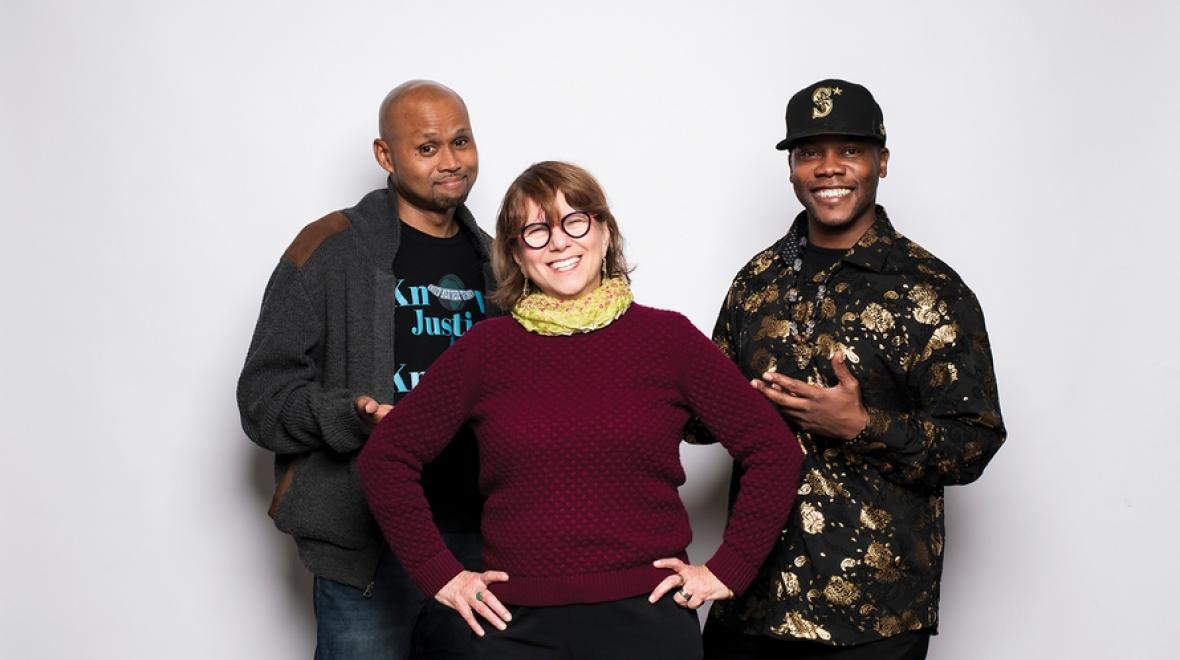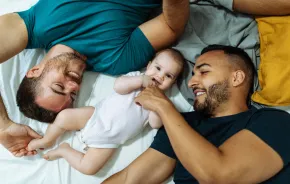ParentMap’s 2023 Superheroes for Washington Kids and Families

Photo:
Left to right: David Heppard, Yaffa Maritz and Kimonti Carter. Photo credit: Will Austin
The Social Justice Activists
Kimonti Carter and David Heppard are two men with a shared past and a shared mission. The pair grew up in the same community in Tacoma and have known each other for more than 30 years. Both were sentenced to life in prison as teenagers and have now been released from prison with help from advocates at the Black Prisoners’ Caucus, an organization founded in 1972 and run by incarcerated and formerly incarcerated individuals in Washington state. Heppard was released in 2017, and Carter in 2022, with Heppard working with a team at BPC to help secure his friend’s release.
Carter is the founder of T.E.A.C.H. (Taking Education and Creating History), a prisoner-led higher education program designed by the BPC to transform incarcerated men into college-educated students. His story is the focus of the inspiring award-winning documentary “Since I Been Down,” by filmmaker Gilda Sheppard. Heppard is the executive director of Washington’s Freedom Project, an organization working to dismantle the poverty-to-prison pipeline. Both are leaders in the Black Prisoners’ Caucus.
During our interview, Heppard shared one of his favorite quotes, credited to Indigenous Australian activist, academic and artist Lilla Watson: “If you have come here to help me, you are wasting your time. But if you have come because your liberation is bound up with mine, then let us work together.”
The quote perfectly represents the importance of solidarity among people with vastly different life experiences and struggles. It’s fitting, given the two were nominated by fellow ParentMap Superhero Yaffa Maritz, who is the cofounder of Listening Mothers and clinical director of both Listening Mothers and Reflective Parenting. Both of these research-based parenting programs focus on mindfulness and community support, and are facilitated through the organization she founded, Community of Mindful Parenting.
At first glance, the three might not seem to have much in common. But Maritz, like Carter and Heppard, believes this work is rooted in community, and in supporting the most vulnerable families and children in our midst. Maritz met Carter when she agreed to help fund friend Gilda Sheppard’s documentary about Carter. Encouraged by Sheppard, Maritz visited Carter in prison, and eventually taught a version of her mindfulness course at the facility where he was incarcerated. She met Heppard when she attended a training he offered on anti-racism. He later took her mindfulness course, with the aim of incorporating aspects of it in his own training courses offered through the Freedom Project.
A 2008 ParentMap Superhero nominee, Yaffa Maritz says the experience of getting to know Carter and Heppard has changed her life.
“The power of community is what really drew me. I saw the communities that they built around them based on compassion, and how when they come out, they’re really held in community in such a beautiful way through these organizations they built for themselves,” says Maritz.
“When we talk about resources, it’s not about handouts: They want to be empowered to bring their brilliance and potential. They just need access. I nominated these two because they are amazing. David has been out for four years and has helped the Freedom Project grow from a staff of four people to 27 people. Kimonti just got out and is already doing brilliant things. So, it shows what can be accomplished when you just provide access.”
What do you wish people understood about your work?
Carter: That lives are valuable and there are a lot of people in prison who don’t deserve to be there. Prison is slavery, to be clear. And we justify it because of a person’s actions. But what that does to a person’s well-being, spirit and mental health? I think it’s dangerous. So, the work I do is to bring healing to those spaces where people are impacted by mass incarceration. I want them to be able to see and understand their worth. What other people would call “reentry.”
Heppard: Mass incarceration has decimated our community. I know it is framed from society’s perspective that people made mistakes and so they have to pay for their actions. But that framing doesn’t take into consideration poverty or racism. It’s built solely on the premise that you did wrong, regardless of the systems of oppression that put you in that place.
If you could destroy one myth, what would it be?
Carter: That punishment is a deterrent.
Heppard: The “violent offender” myth. When they say “violent offender,” what they really mean is somebody Black or Brown. First, for those who do something deemed violent, the recidivism rate is super low. It’s the opposite of what people think. There are lots of programs that won’t support someone who has done something violent. But folks who do come back into the system come back with a crime of poverty, and that’s because they have all of these barriers to getting support. Most programs won’t help them because the idea is that because you did something violent, you are violent. But it’s not true.
Second, the majority of folks who are locked up didn’t do what they’re in prison for. They’re there because of something called “accomplice liability.” What they do is they lock up five or six people for one murder. At the end of the day, even though one person actually did the assault or robbery — or whatever the case — everyone present is punished. Even if they were just a passenger in a car, to the world, they’re a violent offender.
What motivates you most in your life and work?
Carter: When we look around in prison amongst our demographic, we see a bunch of young boys. They’ve been thrown into the system and now the system is telling them they don’t have access to education. So, how are they supposed to be prepared to get back into community?
I am motivated by being able to see the impossible become possible. Being able to see the will of destruction not be able to be held up, and then ultimately be replaced with something that’s healthier and more productive. I’ve been able to see change. I’ve been able to see the tides turn, and I’ve been able to feel the evolution of my own spirit, my own heart — as well as those of others.
Heppard: When I was 16, I got thrown away. And I didn’t just get thrown away figuratively, but literally. I remember what the judge said to me. This 16-year-old child. He told me that I was what was wrong with society and that I don’t belong in society. I remember that — what it did to me emotionally. They had this framing of “he didn’t show any emotion.” What they didn’t realize is that I was traumatized. That was a trauma response. I was stunned. But if they could have watched me go back to my cell … I was crying. I was bawling. I was a child! I remember that feeling of being thrown away. I don’t think anybody should feel that way.
What is one small action ParentMap readers can take in their own lives to make positive change happen?
Carter: The way that you solve these problems is through relationships, not transactions. It’s easy to write a check. And, don’t get me wrong, any of these organizations will willingly accept your donations, but they need your time. Get close to the issue. In order for you to feel the warmth and the breath of these people who are impacted. I promise you, it will change your life.
Heppard: They can do their internal work. That’s going to have the biggest impact. I’m talking about anti-oppression, equity work. When you do your internal work, your healing work, I believe that allows you to show up authentically. Everything becomes better: the way you vote, the way you hire, the way you rent, the way you loan, the way you treat other folks in a space, the things you support. I know folks want me to say, “Go to this website, or do this or that,” but it’s not that simple. It’s deeper than that. Do your work.
Up next: The Healers









